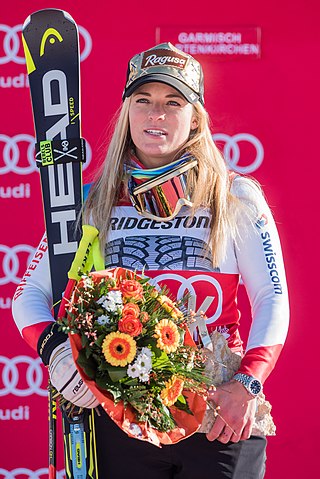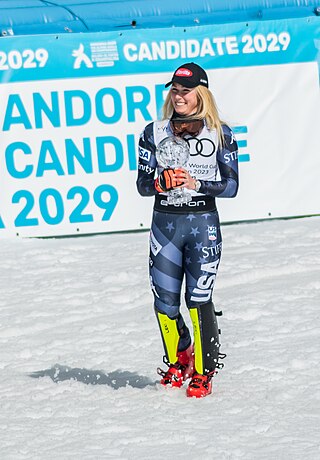
Federica Brignone is an Italian World Cup alpine ski racer. She competes in all alpine disciplines, with a focus on giant slalom and super-G. Brignone won the World Cup overall title in 2020, becoming the first Italian female to achieve this feat. She is also an Olympic and World Championship medalist. At the 2022 Winter Olympics, she won a silver medal in the giant slalom and a bronze in the combined.

The International Ski Federation (FIS) Alpine Ski World Cup, the premier circuit for alpine skiing competition, began in January 1967, and the 2019–20 season marked the 54th consecutive year for the FIS World Cup. As it had every year since 2006, the season began in Sölden, Austria in October. The season was supposed to end with the World Cup finals in March, which were to be held in Cortina d'Ampezzo, Italy for the first time since they began in 1993, but the finals were cancelled due to the COVID-19 outbreak in Italy.

The women's super-G in the 2021 FIS Alpine Skiing World Cup consisted of 6 events, with one cancellation from the scheduled seven. Swiss skier Lara Gut-Behrami won four of the first five Super-Gs to establish an 195-point lead over Swiss teammate and defending discipline champion Corinne Suter with only two races to go, and she clinched the discipline title for 2021 after the sixth event, which turned out to be the last one for the season.

The women's slalom in the 2021 FIS Alpine Skiing World Cup consisted of 9 events, as planned.

The women's giant slalom in the 2020 FIS Alpine Skiing World Cup involved 6 events. The season had been scheduled for nine events, but all of the last three giant slaloms were canceled.

The women's slalom in the 2020 Alpine Skiing World Cup involved 6 events, although there were 9 originally scheduled.

The women's parallel competition in the 2020 FIS Alpine Skiing World Cup was contested as a World Cup discipline separate from slalom for the first time in 2020. Prior to the season, FIS decided to combine parallel skiing events into a new discipline, joining the existing disciplines of downhill, super-G, giant slalom, slalom, and Alpine combined. The discipline winner would receive a small crystal globe, similar to the other disciplines. However, at the same time, FIS decided to drop the city events to reduce the amount of travel required during the World Cup season, planning to replace them with more parallel events at regular venues.

The women's overall in the 2020 FIS Alpine Skiing World Cup involved 30 events in 6 disciplines: downhill (DH), Super-G (SG), giant slalom (GS), slalom (SL), Alpine combined (AC), and parallel (PAR). This was the first year that parallel was treated as a separate discipline; prior to the 2019–20 season, it had been a sub-element of the slalom discipline. The season had originally been scheduled to have 41 races, but 11 races that had originally been scheduled were canceled during the season, mostly due to the COVID-19 pandemic, as discussed below.

The women's slalom in the 2022 FIS Alpine Skiing World Cup consisted of 9 events, including the final.

The women's giant slalom World Cup 2021/2022 consisted of 9 events including the final. Overall World Cup leader Mikaela Shiffrin from the United States, who started out in the early lead in this discipline, contracted COVID-19 at the end of 2021 and missed the post-Christmas giant slalom, then Shiffrin lost the lead in this discipline to Sara Hector of Sweden in the first race in 2022.

The women's downhill in the 2022 FIS Alpine Skiing World Cup consisted of nine events including the finals. Defending champion Sofia Goggia of Italy, who won four of the five downhills in which she competed in 2020-21, continued her domination in 2021-22 by again winning four of the first five downhills. Goggia took a commanding lead in the discipline after American Breezy Johnson, who finished second in each of the first three downhills, missed the rest of the season with a knee injury. Goggia then suffered her own knee injury, including a broken bone and ligament tears, while training for the last downhill prior to the 2022 Winter Olympics, but she was able to continue competing within a month and, after all but the final race of the season, had such a commanding lead that only one other competitor even had a theoretical possibility of overtaking her. At the finals, Suter failed to score, and Goggia won her second consecutive discipline championship.

The women's overall in the 2022 FIS Alpine Skiing World Cup consisted of 37 events in 5 disciplines: downhill (DH), Super-G (SG), giant slalom (GS), slalom (SL), and parallel (PAR). The sixth discipline, Alpine combined (AC), had all of its events in the 2021–22 season cancelled due to the continuing schedule disruption cased by the COVID-19 pandemic, which also happened in 2020-21. In an adjustment that was partially motivated by the pandemic, each of the four main disciplines had nine races, while the parallel discipline had only one. The season did not have any cancellations.

The women's super-G in the 2023 FIS Alpine Skiing World Cup included eight events, including the final. The original schedule called for nine events, but a scheduled downhill at St. Anton on 14 January was converted to a super-G due to the inability to hold pre-race practice runs on either of the two days prior to the event. A later super-G at Cortina was converted into a downhill to restore the original schedule balance, but then a downhill at Crans Montana on 25 February had to be delayed a day due to fog and dangerous course conditions, and the super-G previously scheduled for that day was cancelled and not rescheduled.

The women's giant slalom in the 2023 FIS Alpine Skiing World Cup included ten events, including the final. The season was scheduled to open in Sölden, Austria on 22 October 2022, but the race was cancelled due to bad weather and rescheduled to Semmering, Austria on 27 December.

The women's slalom in the 2023 FIS Alpine Skiing World Cup consisted of eleven events, including the final. The original schedule also called for eleven events, but a night slalom at Zagreb on 5 January was cancelled due to high winds and warm weather and not immediately rescheduled. However, a week later, the race was rescheduled as a second slalom at Špindlerův Mlýn on 28 January, accompanied by a shift of the giant slalom scheduled there that day to Kronplatz on 25 January.

The women's super-G in the 2019 FIS Alpine Skiing World Cup involved 6 events, including the finals in Soldeu, Andorra. Originally, the season had been planned to hold 8 events, but the two races scheduled in Sochi, Russia were cancelled due to continuing heavy snowfall.

The women's giant slalom in the 2019 FIS Alpine Skiing World Cup involved 8 events.

The women's slalom in the 2019 FIS Alpine Skiing World Cup involved 12 events, including three parallel slaloms. At the end of the season, a new discipline was created for parallel races.

The women's slalom in the 2017 FIS Alpine Skiing World Cup involved 10 events, including one parallel slalom and the season finale in Aspen, Colorado (USA).

The Women's Combined in the 2017 FIS Alpine Skiing World Cup involved three events, first a super-combined, and then two Alpine combined. Downhill champion Ilka Štuhec of Slovenia won the super-combined and held on to win the season championship. Interestingly, in only her second race in the combined discipline ever, overall World Cup champion Mikaela Shiffrin won the final race.












